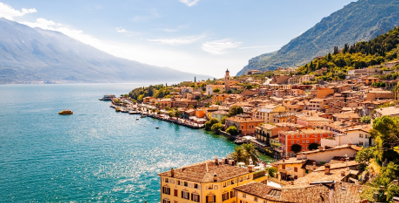Working in Italy; Tips Tricks for a Working Dolce Vita

For many Dutch people, it’s a dream: living and working in la bella Italia. Did you know that this dream is a reality for almost 8,500 Dutch people? But what should you actually consider if you want to pursue your dream? In this blog, you’ll read about things you need to know before you consider taking the step.
The Italian Labor Market
It’s no secret that the Italian labor market is very diverse. In the north, industrial activities are located, while people in the southern regions mainly work in agriculture and tourism.
Fortunately, Italy has a balanced economy with various sectors contributing to the total Gross Domestic Product. Other important sectors include industry, services, the financial sector, technology and innovation, chemistry, and pharmaceuticals.
Italy is also famous for the production of luxury and sports cars. Ferrari, Fiat Chrysler Automobiles (now part of Stellantis, with well-known brands like Fiat, Alfa Romeo, Jeep, and Maserati), Ducati (now part of Lamborghini, itself part of Audi, a division of Volkswagen Group).
Don’t forget that Italy is a world leader in the fashion and design industry. Milan is recognized as a fashion capital where major fashion events are held. Italian designers and brands are known worldwide. Think of Giorgio Armani, Dolce Gabbana, Gucci, Prada, Versace, Valentino, and Fendi.
Salary, Work, and Vacation Hours
Unlike the Netherlands, Italy does not have a minimum wage. Article 36 of the Italian constitution states that workers are entitled to remuneration that is in accordance with the quantity and quality of their work and, in all cases, to appropriate remuneration that guarantees them and their families a free and dignified existence.
It is common to refer to the national collective labor agreements (CCNL) for establishing a minimum wage, which also apply to workers who are not union members.
Working hours generally amount to 40 hours per week, not necessarily calculated based on a fixed workweek, but for each period of 7 days. This means that a “workweek” is actually any period of 7 days, which means an employer can choose any day as the start of a reference week. The number of hours worked per week must not exceed 48 hours, including overtime.
As an employee, you are entitled to 4 weeks of vacation leave annually, but Italy has 11 national holidays, whereas the Netherlands only has 8.
(source: EURES website)
Finding Work
In Italy, many job vacancies are still found in national and regional newspapers. Major newspapers like La Repubblica and Il Corriere della Sera have a separate section for job vacancies.
Another way to find job vacancies is online through common job sites like Indeed and Monster, but also via LinkedIn, and if you’re looking for a job in tourism, there’s a special website: Lavoroturismo.
Of course, you can also find a section on employers’ websites with the organization’s open vacancies. This section is usually referred to as Lavora con noi.
Cost of Living
In addition to the diversity in the labor market, the same applies to the cost of living. The cost of a meal for two in an average restaurant can be up to 25% cheaper in Naples than in Milan, and this also applies to daily groceries. If you want to know the difference between living in the Netherlands and Italy, Numbeo is a handy website for comparing costs.
The costs of renting a house or apartment can also vary in cities or villages. You can search for a home through a local real estate agent or online. Idealista is often used. On social media like Facebook, you can find groups specifically created for Dutch people who want to move to Italy. These kinds of networks can often help you get started.
Learning Italian
Nowadays, quite a few Italians speak a fair amount of English. But in the workplace, the common language is simply Italian! Learning the language is therefore a requirement. You can already start learning through apps on your smartphone, think of Duolingo, Babbel, Memrise, and on the internet, you can find websites like My Italian Language schools, BBC Italian, and Progetto Trio. Of course, you can watch Italian films via streaming services, think of the classic La Dolce Vita, listen to podcasts, or play the entire repertoire of Eros Ramazzotti via music services.
Our Services
Of course, there is much more you need to know and arrange if you decide to emigrate, and we can help and advise you on your way.
Send an email to werken.ineuropa@uwv.nl and we will contact you as soon as possible to tell you much more about living and working in Europe.
